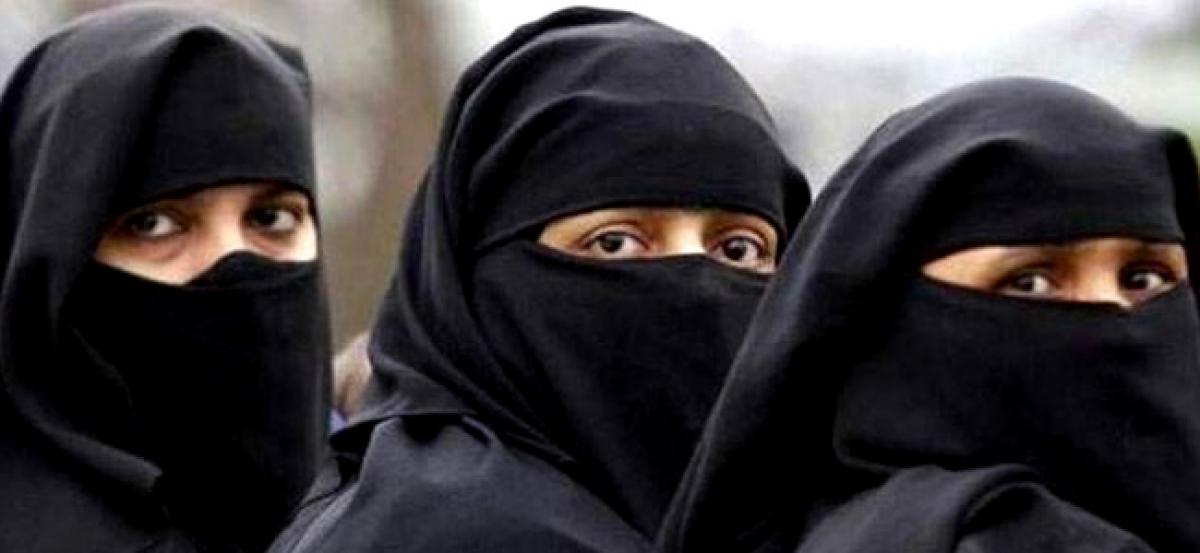Live
- Andhra: Actor Posani booked for derogatory comments against Chandrababu Naidu
- Integrating ML Models into Web-based and Mobile Applications For Real-time Data Analysis and Decision-making
- Sharana sahitya will endure as long as human society exists, opines MP Basavaraj Bommai
- Geetesh Sanodia Drives User Success with Comprehensive Training Programs Using Digital Adoption Platforms like WalkMe and Apty
- Udhayanidhi Stalin And EPS Clash Over Naming Schemes After Karunanidhi
- Sachin Mittal: A Journey from Entertainment to Wedding Excellence
- Bihar CM keeps up his promise, attends wedding festivities of PSO’s son in Haryana’s Rewari
- Fareed Zakaria On Modi's Historic Third Term Amid Global Anti-Incumbency Trend
- Jhansi Fire Tragedy: Father Rescues Seven Infants But Loses Twin Daughters
- Indian Air Force Commanders’ Conference Focuses On Operational Preparedness Amid Border Challenges
Just In

The Supreme Court on Thursday was told that \"triple talaq\" was not fundamental to Islam, as it embarked on examining the constitutional validity of the practise of unilateral divorce prevalent in the Muslim community
New Delhi: The Supreme Court on Thursday was told that "triple talaq" was not fundamental to Islam, as it embarked on examining the constitutional validity of the practise of unilateral divorce prevalent in the Muslim community while making it clear that it would not go into the question of polygamy.
Two senior counsel, appearing for parties seeking an end to the practise of 'triple talaq', put forward this stand before the Constitution Bench headed by Chief Justice of India J.S Khehar, who at the outset had raised the issue whether talaq was fundamental to Islam.
"Polygamy is out," observed Justice Rohinton Fali Nariman soon after the bench framed three questions to be addressed by the counsel appearing for the contending parties, including petitioners challenging the validity of 'triple talaq' and All India Muslim Personal Law Board and other Muslim outfits defending it.
At the outset of the hearing, Chief Justice Khehar asked the contending parties before it to address the question whether 'triple talaq' was fundamental to Islam, whether it was sacrosanct to Islam and whether the practise was an enforceable fundamental right.
The bench also comprising Justice Kurian Joseph, Justice Nariman, Justice Uday Umesh Lalit and Justice S. Abdul Nazeer sought suggestions on the broad parameters of the directions the court may issue while deciding the validity of 'triple talaq'.
Assailing the practise of 'triple talaq', senior counsel Indira Jaising said that if the free informed consent of the woman was imperative for the union of two people in marriage, then how could unilateral act of divorce survive.
Telling the bench that 'triple talaq' was an extra-judicial act and thus unconstitutional, Jaising told the court that can the status of a woman be changed unilaterally, which she described as "civil death".
She told the court that in the Islamic countries the 'triple talaq' had come under judicial oversight.
Noting the vehemence with which Jaising was arguing her point, Justice Nariman noted that "None of you who are opposing triple talaq approached the court till it itself took suo motu cognizance of it by its judgment on October 16, 2015".
Jaising, who appeared for the intervenors Bebak Collective and Centre for Study of Society and Secularism, told the bench that all the personal laws should be subject to fundamental rights and "constitution should not stop where personal law starts and all the personal laws, be it of Hindus, Muslims, Christians and other, should stand the scrutiny of the fundamental rights".
Contending that 'triple talaq' was not an essential part of Islam, senior counsel Amit Singh Chadha told the Constitution Bench that "talaq can only be cogent and reasonable" and if Islamic countries can do away with it then surely it is not an essential part of Muslim religion.
To this, senior counsel Kapil Sibal appearing for the AIMPLB said that they did so by taking the legislative route and not through judicial verdict. He said that personal law can only be changed by the legislature and not by the courts.
Referring to the low divorce rate amongst the Muslims compared to others, Sibal said that it cannot be assumed that a Muslim who will marry will get up one fine morning and utter talaq, talaq, talaq.
Chadha, who appeared for the lead petitioner Sharaya Bano, said that talaq by Muslim women under the Dissolution of Muslim Marriages Act, 1939, was appealable till the top court but not when under the same statute a man divorces his wife.
At one stage during the course of the arguments on Section 2 of the Dissolution of Muslim Marriages Act, 1939, that spells out the grounds' under which Muslim woman can seek dissolution of marriage, Chief Justice Khehar said that the object of the provision is to "further women's rights and not curtail it. We can't look at it as good or bad, but according to law".
Appearing for Bharatiya Muslim Mahila Andolan's co-founder Zakia Suman, senior counsel Anand Grover told the bench that "if court comes to conclusion that it (triple talaq) is not a part of Islamic law, then there is no need for going into the question of its validity under Article 14, 19, 21 and 25".

© 2024 Hyderabad Media House Limited/The Hans India. All rights reserved. Powered by hocalwire.com







